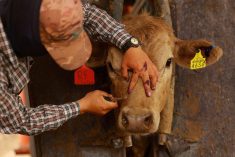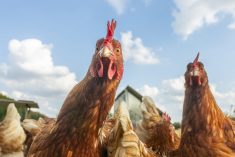The World Organization for Animal Health (OIE) has granted Japan the same “controlled risk” status as Canada for BSE, according to the Reuters news agency.
The move, announced Tuesday, is expected to loosen market access for Japanese beef exports, but is also expected to put pressure on Japan to open its ports to more beef from countries with the same BSE risk status.
“This official categorization of Japan and of other OIE-listed countries contributes to the safety of international trade,” OIE director general Bernard Vallat said in a report Tuesday from Reuters’ Sybille de La Hamaide in Paris.
Read Also

Trump tariff on Brazilian goods could jack up U.S. burger price
U.S. President Donald Trump’s plan for a 50 per cent tariff on goods from Brazil will likely raise prices for the beef that is used in American hamburgers, traders and analysts said on Thursday, as food manufacturers increasingly rely on imports during a time of declining domestic production.
“It also provides guarantees to the consumers because it is the proof that these countries have applied the measures recommended by the OIE based on its adopted standards — to prevent risks to public and animal health,” Vallat told the news agency.
Japan shut its ports to all Canadian cattle, beef and other products in May 2003 when Canada found its first domestic case of BSE in an Alberta cow.
The Japanese government in December 2005 loosened its export restrictions slightly, allowing imports of Canadian beef from cattle aged 20 months and under. The OIE recognized Canada’s “controlled risk” status in May 2007.
While some countries such as the U.S., another “controlled risk” nation, have granted Canada market access over time, Ottawa has been making “ongoing” representations to Japan and other trading partners, asking that they resume trade in all beef and/or cattle based on Canada’s BSE risk status.
According to the Canadian Cattlemen’s Association, Japan had been Canada’s third largest market for beef before May 2003.
In 2002, the CCA said, Canada exported just over $81 million worth of beef to Japan, which the association described as “an important market for certain products that are difficult to sell in Canada.”
Apart from Japan, Canada and the U.S., 29 other countries are listed by the OIE as having “controlled risk” status, including Brazil, the U.K., Ireland and France. Another 10, including Australia and New Zealand, have “negligible risk” status.
Reuters’ de La Hamaide quoted beef industry analysts as saying the OIE’s decision Tuesday would add pressure on Japan to let in more U.S. imports, as “it could hardly ask countries to end restrictions on its meat due to its new OIE status without easing its own limits on U.S. imports.”















